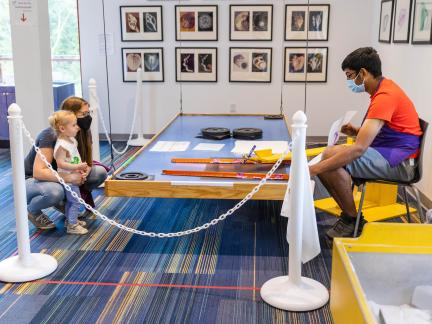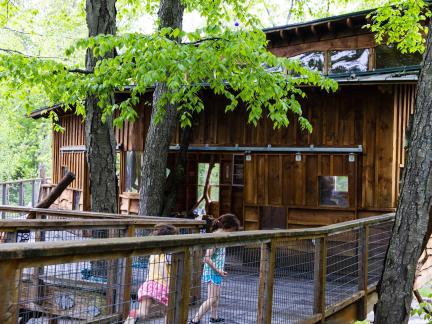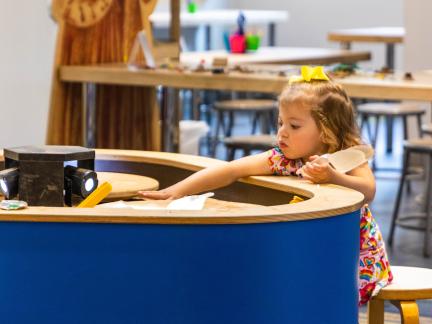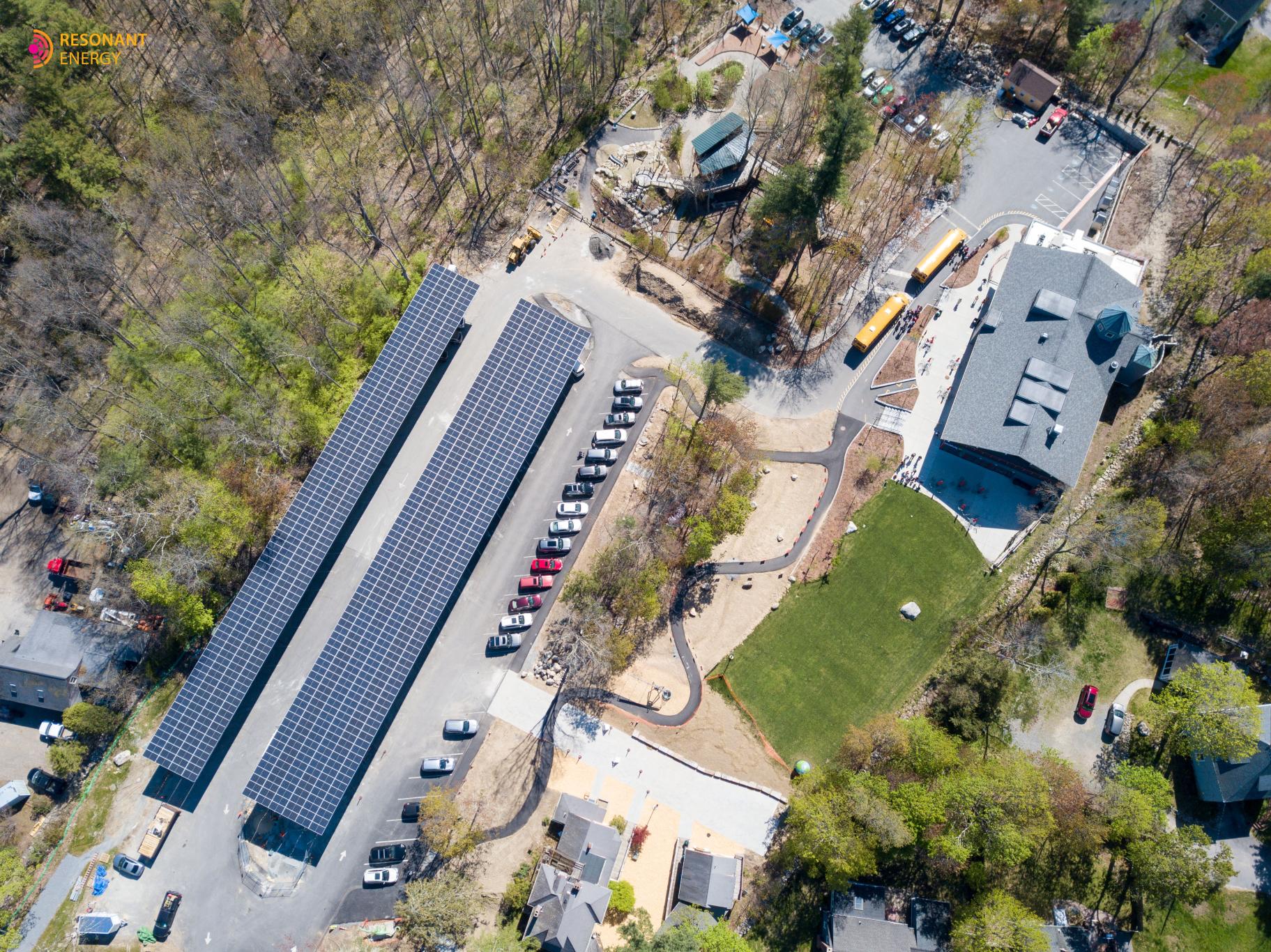Discovery Museum Announces Conversion to 100% On-site Generated Solar Electricity, with Excess Sold at a Discount to Other Nonprofits, a Cornerstone of Its 5-Year Sustainability Plan Toward Carbon Neutrality
Acton, MA – Discovery Museum announced today its conversion to on-site generated solar electricity, a key tenet of the Museum’s 5-year Sustainability Plan objective to reduce greenhouse gas emissions and become carbon neutral.
The Museum has installed a 326kW solar array above a reconfigured parking lot that created more green space on its campus. The 856-panel array represents an annual CO2 reduction of 286 tons—the equivalent of the carbon sequestered by 307 acres of forest each year. The array will produce more electricity than the Museum requires, and the excess will be provided at a discount to other nonprofit institutions.
Carbon Neutral Visiting Initiative™ will offset staff and member travel to the Museum
$1M challenge grant from Sheth Sangreal Foundation underwrites the effort
Solar launch ceremony and Solar Saturday public events to be held Saturday, May 21
Other steps, including a new carbon offset initiative to account for travel to and from the Museum by staff, volunteers, and members, will both reduce the Museum’s carbon footprint and serve as educational outreach for its community.
“Our move to 100% on-site generated solar electricity is a cornerstone of our action plan to reduce the environmental impact of the Museum’s operations and lead by example to inspire others to take action on behalf of our planet,” said CEO Neil Gordon. “We hope to set the bar for what museums and other cultural institutions should be looking to do to help combat climate change and educate their communities about planning for sustainable and resilient futures.”
Discovery Museum’s 5-year Sustainability Plan, approved unanimously by its Board of Directors in June 2021, outlines 29 action steps for environmental improvement that span all area of its operations including reducing greenhouse gas emissions and becoming carbon neutral; reducing water usage; minimizing waste generation; investing sustainably; and advocating for climate action. The plan is publicly available on the Museum’s website.
Solar Launch Ceremony and Solar Saturday, May 21
On Saturday, May 21, 11:00am, the Museum will hold a public ceremony to celebrate its conversion to solar electricity, attended by Town officials, state and local representatives, and community organizations. State Senator James Eldridge and State Representative Danillo Sena will be part of the launch ceremony, among others.
From 10:30am to 1:00pm, the Museum will offer “Solar Saturday” public programming, exploring the endless possibilities of solar energy through simple experiments to see the sun’s energy in action, a sun scavenger hunt, and an exploration of how solar panels work.
Discount Resale of Excess Energy to Community Organizations
Discovery Museum worked with Resonant Energy, a Dorchester-based solar provider focused on nonprofits, to develop the solar installation and to coordinate the sale of excess electricity to other area non-profit organizations that might otherwise not have access to renewable energy options. Resonant Energy also worked with Collective Sun, a San Diego-based solar financier, to obtain an upfront discount for the Museum and ensure a favorable cashflow for the project. Haley House, Boston, is one of five nonprofit organizations that will receive energy from the program; the other four are expected to be announced at the May 21 launch event.
"Discovery Museum's hyper-local community solar project is truly unique in both its size and the number of organizations that will benefit from the project,” said Madeleine Barr, Co-Founder at Resonant Energy. “We’ve worked with over 150 nonprofits in MA and no other organization has taken on a clean energy project of this scope. The Museum’s decision to produce more energy than it needs in order to share it with five other nonprofit organizations is a huge step towards building a more collaborative and accessible clean energy economy.”
Carbon Neutral Visiting Initiative™
Discovery Museum is also kicking off a first-of-its-kind program to offset the greenhouse gasses emitted by staff and members driving to and from the Museum. Created in partnership with Carbon Credit Capital and Environment & Culture Partners, the Carbon Neutral Visiting Initiative will raise and provide funds annually to the Hernando County Landfill Electric Generation Project in Florida, a project through which greenhouse gasses emitted by the landfill are captured and converted to electricity.
Discovery Museum’s contribution to this project will fund the conversion of at least 134 metric tons of greenhouse gas reduction per year. The program will raise funds through a nominal and optional fee on new and renewed Museum memberships and a contribution from the Museum to cover staff and volunteer travel to and from the campus and other staff business travel.
“Discovery Museum’s implementation of on-site generated solar power to meet 100% of its electricity needs is a first among children’s museums in the country,” said Sarah Sutton, Co-Founder & CEO, Environment & Culture Partners. “And as the founding participant in the Carbon Neutral Visiting Initiative, the Museum has helped to create a model for offering offsets to visitors that will both educate families and mitigate the impact of travel to cultural organizations.”
Funding includes Sheth Sangreal Foundation $1M Challenge Grant and MA Cultural Facilities Fund $200,000 Grant
The implementation of the Museum’s Sustainability Plan and expanded environmental education and inclusion initiatives are significantly funded through a 5-year, $1M challenge grant awarded by Brian Sheth and Adria Sheth’s Sangreal Foundation. A $200,000 grant from the Massachusetts Cultural Facilities Fund, along with significant support from the Amelia Peabody Charitable Fund and the Nathaniel and Elizabeth P. Stevens Foundation, funded the site preparation for the solar installation last year.
Photo (c) Resonant Energy
************
About Discovery Museum
Discovery Museum is a hands-on museum that blends science, nature, and play, inspiring families to explore and learn together. The museum and its Discovery Woods accessible outdoor nature playscape and 550sf treehouse blend the best of STEAM (Science, Technology, Engineering, Art and Math) learning on a beautiful 4.5-acre campus abutting 180 acres of conservation land in Acton, MA, about 20 miles west of Boston. Originally founded in 1982 and expanded to two museums in 1987, the museum reopened in a single, 16,000sf accessible building after a complete renovation and expansion in early 2018. Hands-on, open-ended exhibits developed by professional educators inspire curiosity and exploration, providing a fun and engaging experience for children and adults to discover their world together. Serving families and schools from towns throughout the region, the museum is devoted to informal education that enhances classroom learning. Discovery Museum is committed to accessibility and is a proud recipient of the 2017 Massachusetts Commonwealth Award, the only winner in the Access category, and a 2018 LEAD® Community Asset Award from The John F. Kennedy Center for the Performing Arts. Discovery Museum is a community-supported non-profit organization. Discovery Museum programming is supported in part by a grant from the Massachusetts Cultural Council, a state agency.
About Resonant Energy
Resonant Energy is a community-based solar provider that believes that everyone has a right to clean affordable solar. We help under-invested communities take their place at the forefront of the global transition to clean energy. Through partnerships with local nonprofits, we deliver high-quality solar arrays for houses of worship, affordable housing providers, and homeowners — regardless of income. Thanks to our network of local investors, we are making solar power accessible for low-income households and nonprofits at no upfront cost, and in some cases, at no cost at all. We currently serve communities in Massachusetts, New York City, and Long Island.
About CollectiveSun
Founded in 2011, CollectiveSun provides cost-effective solar energy financing for tax-exempt organizations across the United States. The firm’s proprietary funding models have enabled more than 180 nonprofit organizations to utilize solar tax benefits normally unavailable to tax-exempt organizations. CollectiveSun reduces the cost of a nonprofit solar project by 12% or more and provides access to the least expensive funding options for the remaining cost. Additionally, the firm’s deep expertise in solar engineering, solar finance, and project management expedites and simplifies the process of going solar for its nonprofit partners www.collectivesun.com.
About the Carbon Neutral Visiting Initiative
With over 35,000 cultural institutions in the U.S. welcoming millions of visitors each year and contributing to this value, the Carbon Neutral Visiting Initiative™ (CNVI) was developed to mitigate the impacts of travel to cultural organizations. Through a small fee, often a dollar or less, visitors can offset these emissions by supporting a positive climate action-project. Projects may focus on forest conservation, renewable energy, or clean water and sanitation all of which impact our climate. CNVI is managed by Carbon Credit Capital (CCC) and Environment & Culture Partners (ECP). More information can be found at: www.ecprs.org/engagement/cnvi
About Carbon Credit Capital
Carbon Credit Capital LLC (CCC) has been a carbon offset project developer, broker and consulting service provider in the voluntary carbon markets since 2006. We create actionable, pragmatic, and financially feasible carbon offset strategies to curb Greenhouse Gas emissions for private and public institutions globally. CCC is a Certified B-Corporation, 1% for the Planet and Green America Green Business Member.
About ECP
ECP is a US-based non-profit working to accelerate environmental leadership of the cultural sector. ECP’s flagship initiatives include CNVI, Culture Over Carbon, a National Leadership Grant from the Institute of Museum and Library Services for a groundbreaking, multi-institution energy assessment project, and the Frankenthaler Climate Initiative, a $10M grant program supporting energy efficiency and clean energy projects at visual arts institutions. ECP also leads the US cultural sector’s national and global participation in America is All In.
###




